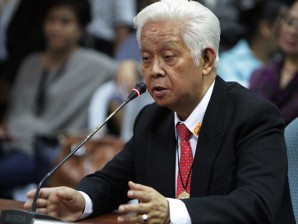Comelec OKs rival leftist party-listers
After a protracted word war on who should be disqualified from the 2013 elections, party-list groups Akbayan and Bayan Muna both ended up getting the nod of the Commission on Elections (Comelec) to vie for congressional seats next year.
The Comelec on Tuesday voted 4-2 in favor of the two rival groups, citing their history and “established” track record in working and advocating for the marginalized and underrepresented sectors of the society.
Comelec Chairman Sixto Brillantes Jr. disclosed in an interview that he joined the dissenting vote because he believed that both groups were multisectoral like Ako Bicol and they could be considered political parties.
“Although they (four election commissioners) are saying that these groups have a track record unlike Ako Bicol which was new in 2010… these are old political parties existing way back in 1998,” Brillantes told reporters.
Those who voted in favor were Commissioners Rene Sarmiento, Christian Robert Lim, Elias Yusoph and Armando Velasco. Brillantes and Commissioner Lucenito Tagle dissented while Commissioner Grace Padaca took no part.
Article continues after this advertisementIn her Twitter account, Padaca explained that she did not participate because she was not part of the Comelec when it first tackled the issue. “When they resumed the discussion, I decided to stick with my position that I will be taking no part,” she said.
Article continues after this advertisementTrack record
In a separate interview Tuesday, Sarmiento said he voted in favor of Bayan Muna and Akbayan since both passed the test under the eight guidelines enumerated in the decision of the Ang Bagong Bayani v Comelec case in 2001, penned by then Chief Justice Artemio Panganiban.
“Both of them have a long track record… more or less that’s the theme, the essence of the resolutions,” said Sarmiento. Copies of the two rulings were not yet available to the media Tuesday.
The guidelines say the political party or sector must represent the marginalized and underrepresented groups identified in the Constitution and that the party or organization must not be “an adjunct of” or a “project organized or an entity funded or assisted by the government.”
It also said that the nominee of a party must represent the marginalized and underrepresented sectors.
Sarmiento said both groups deserved reaccreditation since they have a history of struggle and through the party-list system, they had been given the opportunity to participate in mainstream politics.
He said the Supreme Court ruling on the Ang Bagong Bayani had stressed that the party-list system was a tool aimed to benefit the poor and the marginalized and also an invitation, including to “those in the underground” to come out… and grab the opportunity to join mainstream politics.
Earlier, Akbayan and Bayan Muna accused each other of not genuinely representing the marginalized and the underrepresented sector.
Akbayan is currently represented in Congress by Walden Bello and Arlene Bag-ao while Bayan Muna is being represented by Teodoro Casiño and Neri Colmenares.
Poll watchdog Kontra Daya and several groups identified with the Bayan Muna had filed two disqualification complaints against Akbayan before the Comelec, alleging that the latter was already a party in power and therefore, has ceased to be a marginalized party.
In a statement, Akbayan on Tuesday welcomed the Comelec decision, saying: “The decision affirms Akbayan for what it is: a genuine representative of the marginalized and underrepresented,” it stated.
Bayan Muna, on the other hand, said it was “aghast” at the decision and called for reforms in the party-list system. With a report by Leila Salaverria
